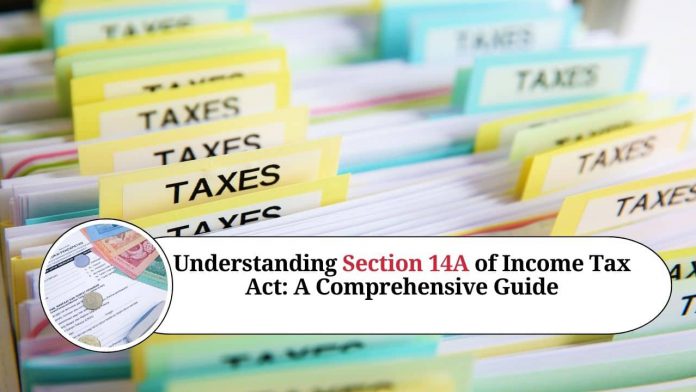The Income Tax Act, of 1961 contains several provisions that are aimed at ensuring that taxpayers do not evade taxes. One such provision is Section 14A, which deals with the disallowance of expenses incurred about income that is not chargeable to tax. This provision has significant implications for taxpayers, especially those who are engaged in investments. In this article, we will discuss the key provisions of Section 14A, its interpretation, and its impact on taxpayers.
Section 14A: An Overview Section
14A of the Income Tax Act, 1961, deals with the disallowance of expenses incurred about income that is not chargeable to tax. The section states that no deduction shall be allowed in respect of expenses incurred by the taxpayer about income that does not form part of the total income under the Act. The objective of this provision is to ensure that taxpayers do not claim deductions for expenses that are related to earning exempt income.
Interpretation of Section 14A The interpretation of Section 14A has been a subject of debate among taxpayers and tax authorities. The provision is quite broad and covers all types of expenses incurred by the taxpayer, including interest, depreciation, and administrative expenses. The section applies to both individuals and companies and has significant implications for taxpayers who are engaged in investments.
The key issue in interpreting Section 14A is determining the expenses that are directly attributable to earning exempt income. The provision does not provide any guidance on how to determine the expenses that are attributable to exempt income. As a result, taxpayers and tax authorities have different interpretations of the provision.
Impact of Section 14A on taxpayers
Impact of Section 14A on Taxpayers Section 14A has a significant impact on taxpayers, especially those who are engaged in investments. The provision makes it difficult for taxpayers to claim deductions for expenses that are related to earning exempt income. For instance, if an individual invests in a tax-free bond and incurs expenses related to the investment, such as brokerage and custody fees, the expenses cannot be claimed as a deduction from taxable income.
In addition, Section 14A has also led to disputes between taxpayers and tax authorities. Taxpayers may have different interpretations of the provision, and the tax authorities may disallow certain expenses claimed by the taxpayer. As a result, taxpayers may have to go through a lengthy appeals process to resolve the dispute.
Conclusion
Section 14A of the Income Tax Act, of 1961, is a provision aimed at preventing taxpayers from claiming deductions for expenses related to earning exempt income. The provision has significant implications for taxpayers, especially those who are engaged in investments. Taxpayers need to be aware of the provisions of Section 14A and ensure that they do not claim deductions for expenses related to earning exempt income. The provision has also led to disputes between taxpayers and tax authorities, and taxpayers should be prepared for such disputes and go through the appeals process if necessary.
Other Related Blogs: Section 144B Income Tax Act
Frequently Asked Questions
Q:1 What is Section 14A of the Income Tax Act?
A: Section 14A of the Income Tax Act, 1961, deals with the disallowance of expenses incurred about income that is not chargeable to tax.
Q:2 What types of expenses are covered under Section 14A?
A: Section 14A covers all types of expenses incurred by the taxpayer, including interest, depreciation, and administrative expenses.
Q:3To who does Section 14A apply?
A: Section 14A applies to both individuals and companies.
Q:4 What is the objective of Section 14A?
A: The objective of Section 14A is to ensure that taxpayers do not claim deductions for expenses that are related to earning exempt income.
Q:5 What is exempt income?
A: Exempt income is income that is not chargeable to tax. Examples of exempt income include income from tax-free bonds and income from agricultural activities.
Q:6 How does Section 14A impact taxpayers who are engaged in investments?
A: Section 14A makes it difficult for taxpayers to claim deductions for expenses that are related to earning exempt income. For instance, if an individual invests in a tax-free bond and incurs expenses related to the investment, such as brokerage and custody fees, the expenses cannot be claimed as a deduction from taxable income.
Q:7 How do taxpayers determine the expenses that are directly attributable to earning exempt income?
A: Section 14A does not provide any guidance on how to determine the expenses that are attributable to exempt income. As a result, taxpayers and tax authorities have different interpretations of the provision.
Q:8 What should taxpayers do to ensure compliance with Section 14A?
A: Taxpayers need to be aware of the provisions of Section 14A and ensure that they do not claim deductions for expenses related to earning exempt income.
Q:9 What should taxpayers do if they have a dispute with the tax authorities regarding Section 14A?
A: Taxpayers should be prepared for disputes with the tax authorities regarding Section 14A and go through the appeals process if necessary.




















